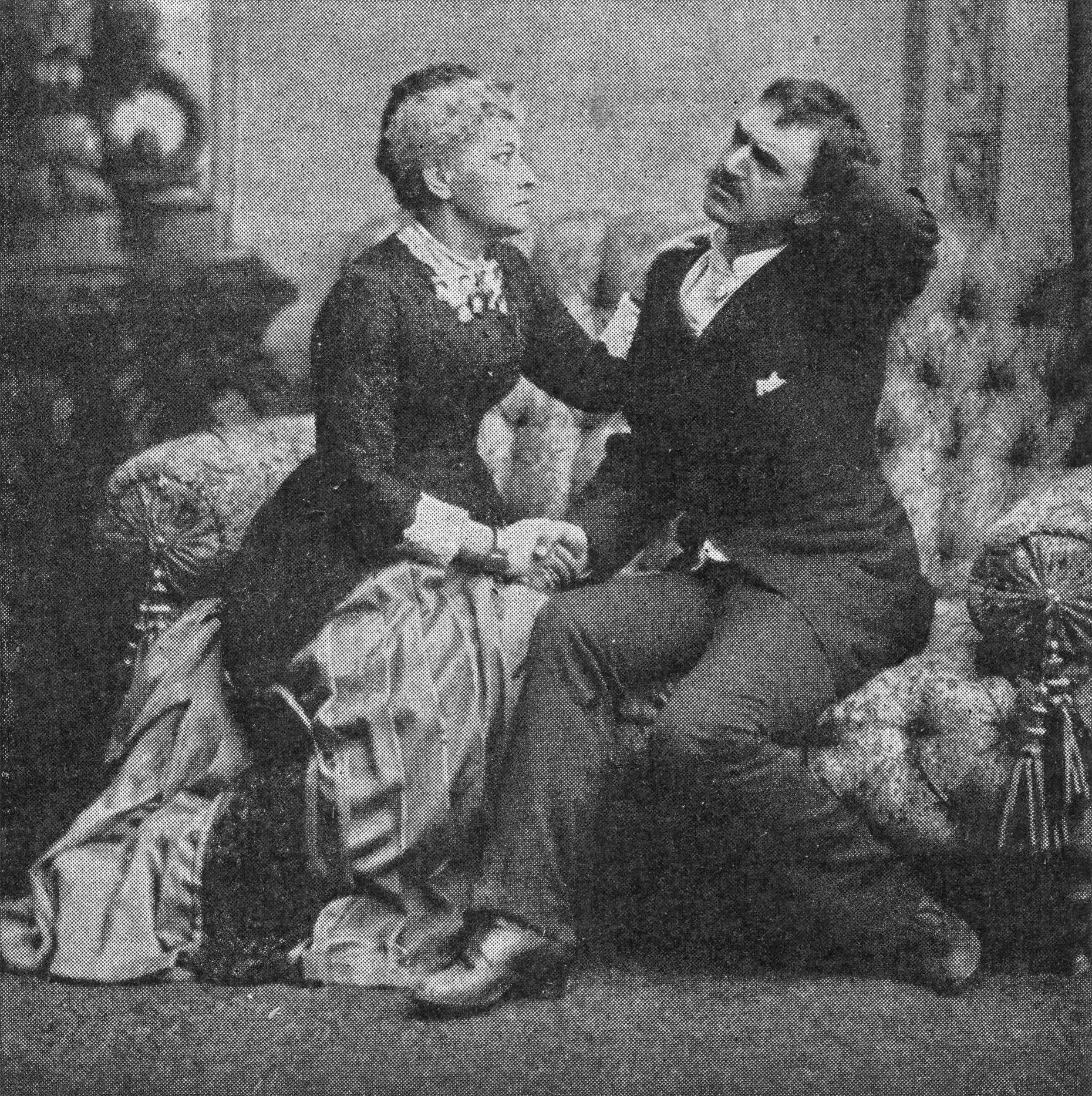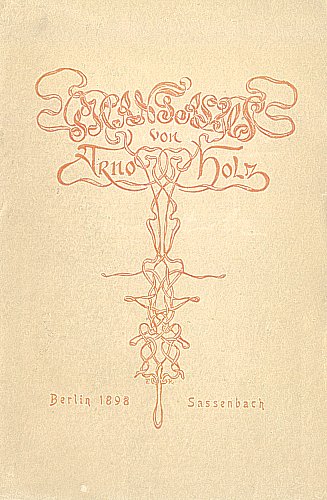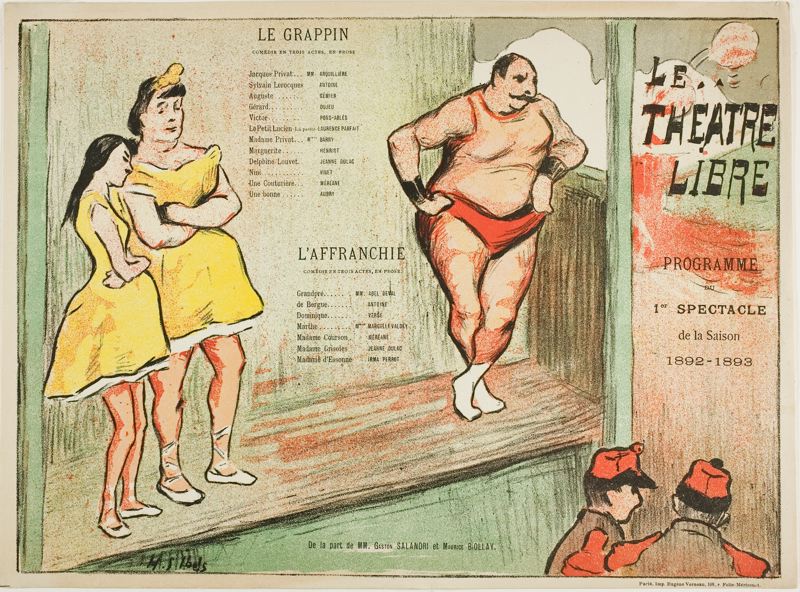|
Die Freie Bühne
Die Freie Bühne (German: "The Free Stage") was a subscription-based theatre club founded in Berlin, Germany in 1889 by ten writers and theatre critics supervised by Otto Brahm for the purpose of staging new, naturalistic plays that were censored, not commercially viable, or not otherwise commonly produced. The ten founding members were Otto Brahm, Maximilian Harden, Theodor Wolff, Julius Hart and Heinrich Hart, Paul Schlenther, Julius Elias, Julius Stettenheim, Paul Jonas and Samuel Fischer. Inspired in part by André Antoine's Théâtre-Libre in Paris, Brahm's company gave private performances to subscribers only. Performances were held on Sunday afternoons. The ''Freie Bühne'' opened with a production of Ibsen's "Ghosts" (1881), in September 1889. Later productions included works by writers such as Gerhardt Hauptmann, Arno Holz, Émile Zola, August Strindberg, as well as dramatic adaptations of Tolstoy. The ''Freie Bühne'' closed in 1894, mostly due to the fact that larger ... [...More Info...] [...Related Items...] OR: [Wikipedia] [Google] [Baidu] |
Otto Brahm
Otto Brahm (born Otto Abrahamsohn on 5 February 1856 in Hamburg; died 28 November 1912 in Berlin) was a German drama and literary critic, theatre manager and director. His productions were noted for being accurate and realistic. He was involved in the foundation of the progressive '' Die Freie Bühne'' (English: ''Free Stage'') company, of which he became president and producer. He also edited the company's weekly magazine of the same name, but later changed its name to '' Die neue Rundschau''. Brahm also managed the Deutsches Theater in Berlin, and was responsible for modernising its output. From Heinz Herald's memoir of Max Reinhardt entitled '' Bildnis eines Theater-Mannes'', regarding the birth of modern theatre: In Germany, the explosion came in 1889, embodied by Otto Brahm. Her place was the newly grounded vacant stage, her occasion is the premiere of a young unknown poet. His name was Gerhart Hauptmann, his play ''Before Sunrise''. Opinions collapsed, as the representat ... [...More Info...] [...Related Items...] OR: [Wikipedia] [Google] [Baidu] |
Ghosts (play)
''Ghosts'' () is a play by the Norwegian playwright Henrik Ibsen. It was written in Danish and published in 1881, and first staged in 1882 in Chicago, Illinois, US, performed in Danish. Like many of Ibsen's plays, ''Ghosts'' is a scathing commentary on 19th-century morality. Because of its subject matter, which includes religion, venereal disease, incest, and euthanasia,Ibsen, Henrik, ''Ghosts. Four Major Plays''. Oxford World's Classic. Oxford University Press. (1981) it immediately generated strong controversy and negative criticism. Since then, the play has come to be considered a "great play" that historically holds a position of "immense importance". Theater critic Maurice Valency wrote in 1963, "From the standpoint of modern tragedy ''Ghosts'' strikes off in a new direction.... Regular tragedy dealt mainly with the unhappy consequences of breaking the moral code. ''Ghosts'', on the contrary, deals with the consequences of not breaking it." Ibsen disliked the English tr ... [...More Info...] [...Related Items...] OR: [Wikipedia] [Google] [Baidu] |
Theatres Completed In 1889
Theatre or theater is a collaborative form of performing art that uses live performers, usually actors to present experiences of a real or imagined event before a live audience in a specific place, often a stage. The performers may communicate this experience to the audience through combinations of gesture, speech, song, music, and dance. It is the oldest form of drama, though live theatre has now been joined by modern recorded forms. Elements of art, such as painted scenery and stagecraft such as lighting are used to enhance the physicality, presence and immediacy of the experience. Places, normally buildings, where performances regularly take place are also called "theatres" (or "theaters"), as derived from the Ancient Greek θέατρον (théatron, "a place for viewing"), itself from θεάομαι (theáomai, "to see", "to watch", "to observe"). Modern Western theatre comes, in large measure, from the theatre of ancient Greece, from which it borrows technical terminolog ... [...More Info...] [...Related Items...] OR: [Wikipedia] [Google] [Baidu] |
Independent Theatre Society
The Independent Theatre Society was a by-subscription-only organisation in London from 1891 to 1897, founded by Dutch drama critic Jacob Grein to give "special performances of plays which have a literary and artistic rather than a commercial value."''The Independent Theatre'' (A Glimpse of Theatre History), accessed 15 January 2009 The society was inspired by its continental forerunners, the '' Théâtre-Libre'' (Free Theatre) and '' Die Freie Bühne'' (Free Stage). The Society produced modern realist plays, mostly by continent ... [...More Info...] [...Related Items...] OR: [Wikipedia] [Google] [Baidu] |
Leo Tolstoy
Count Lev Nikolayevich Tolstoy Tolstoy pronounced his first name as , which corresponds to the romanization ''Lyov''. () (; ,Throughout Tolstoy's whole life, his name was written as using Reforms of Russian orthography#The post-revolution reform, pre-reform Russian orthography. ; ), usually referred to in English as Leo Tolstoy, was a Russian writer. He is regarded as one of the greatest and most influential authors of all time. Born to an aristocratic family, Tolstoy achieved acclaim in his twenties with his semi-autobiographical trilogy, ''Childhood (Tolstoy novel), Childhood'', ''Boyhood (novel), Boyhood'' and ''Youth (Tolstoy novel), Youth'' (1852–1856), and with ''Sevastopol Sketches'' (1855), based on his experiences in the Crimean War. His ''War and Peace'' (1869), ''Anna Karenina'' (1878), and ''Resurrection (Tolstoy novel), Resurrection'' (1899), which is based on his youthful sins, are often cited as pinnacles of Literary realism, realist fiction and three of th ... [...More Info...] [...Related Items...] OR: [Wikipedia] [Google] [Baidu] |
August Strindberg
Johan August Strindberg (; ; 22 January 184914 May 1912) was a Swedish playwright, novelist, poet, essayist, and painter.Lane (1998), 1040. A prolific writer who often drew directly on his personal experience, Strindberg wrote more than 60 plays and more than 30 works of fiction, autobiography, history, cultural analysis, and politics during his career, which spanned four decades. A bold experimenter and iconoclast throughout his life, he explored a wide range of dramatic methods and purposes, from naturalistic tragedy, monodrama, and historical plays to his anticipations of expressionist and surrealist dramatic techniques. From his earliest work, Strindberg developed innovative forms of dramatic action, language, and visual composition. He is considered the "father" of modern Swedish literature and his '' The Red Room'' (1879) has frequently been described as the first modern Swedish novel. In Sweden, Strindberg is known as an essayist, painter, poet, and especially noveli ... [...More Info...] [...Related Items...] OR: [Wikipedia] [Google] [Baidu] |
Émile Zola
Émile Édouard Charles Antoine Zola (, ; ; 2 April 184029 September 1902) was a French novelist, journalist, playwright, the best-known practitioner of the literary school of Naturalism (literature), naturalism, and an important contributor to the development of Naturalism (theatre), theatrical naturalism. He was a major figure in the political liberalization of France and in the exoneration of the falsely accused and convicted army officer Alfred Dreyfus, which is encapsulated in his renowned newspaper opinion headlined ''J'Accuse...!'' Zola was nominated for the first and second Nobel Prize in Literature, Nobel Prizes in Literature in 1901 and 1902. Early life Zola was born in Paris in 1840 to François Zola (originally Francesco Zolla) and Émilie Aubert. His father was an Italian engineer with some Greeks, Greek ancestry, who was born in Venice in 1795, and engineered the Zola Dam in Aix-en-Provence; his mother was French. The family moved to Aix-en-Provence in the Provence, ... [...More Info...] [...Related Items...] OR: [Wikipedia] [Google] [Baidu] |
Arno Holz
Arno Hermann Oscar Alfred Holz (26 April 1863 – October 1929) was a German naturalist poet and dramatist. He is best known for his poetry collection ''Phantasus'' (1898). He was nominated for a Nobel Prize in Literature, Nobel prize in literature nine times. Life and Works Holz was born in Rastenburg, East Prussia (now Kętrzyn, Poland), the son of pharmacist Hermann Holz and Franziska ''née'' Werner. The family moved to Berlin in 1875. After his schooling, Holz worked in 1881 as a journalist but chose a living as a freelance writer. He was beset with financial difficulties for much of his life. He established contacts with the Berlin naturalist club ''Durch'' where he met famed writer Gerhart Hauptmann. In 1885 his poetry collection, ''Buch der Zeit'' (book of time) won the Schiller Prize. Around this time, Holz was fascinated by Darwinism. From 1888 onward Holz lived and worked together with translator and writer Johannes Schlaf. Together they developed a theory of "consis ... [...More Info...] [...Related Items...] OR: [Wikipedia] [Google] [Baidu] |
Gerhart Hauptmann
Gerhart Johann Robert Hauptmann (; 15 November 1862 – 6 June 1946) was a German dramatist and novelist. He is counted among the most important promoters of Naturalism (literature), literary naturalism, though he integrated other styles into his work as well. He received the 1912 Nobel Prize in Literature, Nobel Prize in Literature in 1912. Life Childhood and youth Gerhart Hauptmann was born in 1862 in Szczawno-Zdrój, Obersalzbrunn, now known as Szczawno-Zdrój, in Lower Silesia (then a part of the Kingdom of Prussia, now a part of Poland). His parents were Robert and Marie Hauptmann, who ran a hotel in the area. As a youth, Hauptmann had a reputation of being loose with the truth. His elder brother was Carl Hauptmann. Beginning in 1868, he attended the village school and then, in 1874, the Realschule in Breslau for which he had only barely passed the qualifying exam. Hauptmann had difficulties adjusting himself to his new surroundings in the city. He lived, along with his ... [...More Info...] [...Related Items...] OR: [Wikipedia] [Google] [Baidu] |
Henrik Ibsen
Henrik Johan Ibsen (; ; 20 March 1828 – 23 May 1906) was a Norwegian playwright, poet and actor. Ibsen is considered the world's pre-eminent dramatist of the 19th century and is often referred to as "the father of modern drama." He pioneered theatrical realism, but also wrote lyrical epic works. His major works include ''Brand'', ''Peer Gynt'', '' Emperor and Galilean'', '' A Doll's House'', '' Ghosts'', '' An Enemy of the People'', '' The Wild Duck'', '' Rosmersholm'', '' Hedda Gabler'', '' The Master Builder'', and '' When We Dead Awaken''. Ibsen is the most frequently performed dramatist in the world after Shakespeare, and ''A Doll's House'' was the world's most performed play in 2006. Ibsen was born into the merchant elite of the port town of Skien, and had strong family ties to the families who had held power and wealth in Telemark since the mid-1500s. Both his parents belonged socially or biologically to the Paus family of Rising and Altenburggården—the extende ... [...More Info...] [...Related Items...] OR: [Wikipedia] [Google] [Baidu] |
Maximilian Harden
__NOTOC__ Maximilian Harden (born Felix Ernst Witkowski, 20 October 1861 – 30 October 1927) was an influential German journalist and editor. Biography Born the son of a Jewish merchant in Berlin, he attended the '' Französisches Gymnasium'' until he began to train as an actor and joined a traveling theatre troupe. In 1878 Harden converted to Protestantism and started his journalistic career as a theatre critic in 1884. He also published political essays under the pseudonym ''Apostata'' in several liberal newspapers like the '' Berliner Tageblatt'' edited by Rudolf Mosse. Commencing from 1892, Harden published the journal '' Die Zukunft'' (''The Future'') in Berlin. His baroque style was mocked by former friend Karl Kraus, who wrote a satire on "translations from Harden". Initially a monarchist, Harden became a fierce critic of Kaiser Wilhelm II and his entourage including Philipp, Prince of Eulenburg, and General Kuno von Moltke. His public accusations, from 1906 on for ... [...More Info...] [...Related Items...] OR: [Wikipedia] [Google] [Baidu] |
Théâtre Libre
The Théâtre Libre (; "Free Theatre") was a theatre company that operated from 1887 to 1896 in Paris, France. Origins and History Théâtre Libre was founded on 30 March 1887 by André Antoine (actor), André Antoine. The primary goal of the theatre was to present new plays that were untried and unproduced by the commercial houses. Antoine was driven to open his own theatre company to create a dramatization of an Émile Zola novel, ''Thérèse Raquin'', after the theater group for which he previously worked had refused. In order to ensure that the Théâtre Libre was exempt from censorship and could produce plays that other theaters would not, the theatre was supported solely by subscribers. This allowed the Théâtre Libre to collect no money at the door meaning it was not legally considered a theatre. Being a "free" theatre, in the case of Théâtre Libre, meant being a theatre that presented naturalism and was dedicated to producing plays in any and all genres that had not b ... [...More Info...] [...Related Items...] OR: [Wikipedia] [Google] [Baidu] |








